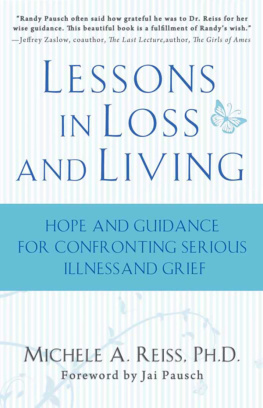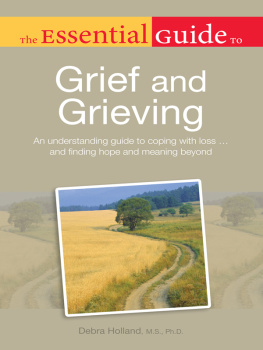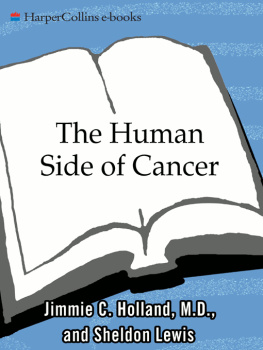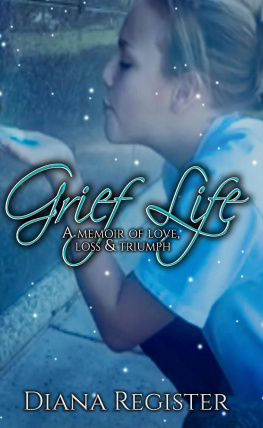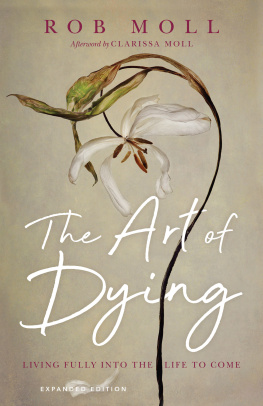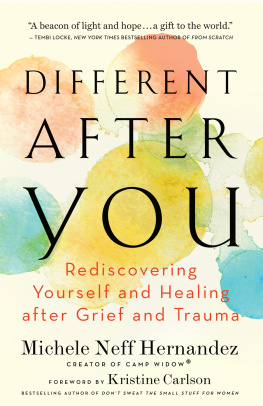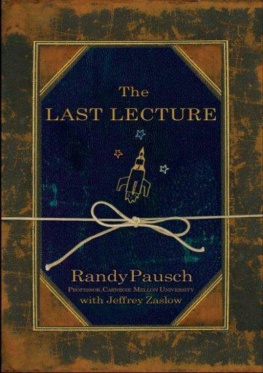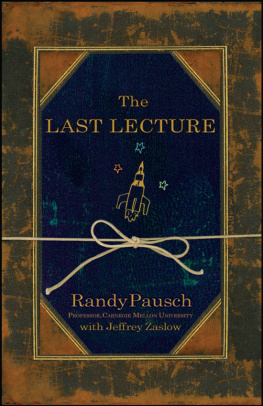
Each of the stories in this book is about an amazing person I know or have known. In most instances their identifying characteristics have been altered for privacy reasons, but I believe their grace and spirit shine through. Whether colleague, friend, family member, or client, I have been blessed to have each of these people in my life.
And this book is dedicated to all of them.
CONTENTS
In the late summer of 2006, my husband and Carnegie Mellon professor Dr. Randy Pausch was diagnosed with pancreatic cancer. At the time, Randy and I were living a dream life together. We had two young sons and a new baby girl. We were putting an addition onto the house where we planned to raise our children. We loved each other and the world that we had created for ourselves.
When Randy was told that he might have only three to six months to live, our dream life came to a crashing halt. I tried to adjust to the new reality: I would have to raise our children alone, in the house where Randy and I were supposed to grow old together. Meanwhile, Randy coped with the ordeal of cancer symptoms, cancer treatments, and the very real fear of possibly imminent death. Put all of this together, and you have a recipe for disaster.
Randy and I realized the negative impact that all of this stress was having on our lives, our love, and our family. We tried working through these problems together, but without success. Randy had consulted with some of the best and brightest specialists to help improve his odds of beating one of the most fatal cancers. He had an impressive health-care team comprised of oncologists, surgeons, radiologists, and nurses, who joined us in our battle against cancer. However, we had overlooked the psychological aspect of the disease. Cancer doesnt just do physical damage. It erodes your ability to love and enjoy life. It can make you miss out on the precious living time that you have left and make you act and feel like youre dead, when youre still very much alive. You can probably replace the word cancer with almost any other terrible challenge that life can dish up to you. But our experience was with pancreatic cancer.
Luckily, our oncologist recommended a local psychotherapist who works mainly with folks whose lives are affected by cancer or other life-threatening illnesses. In the past, Randy hadnt been a great believer in the benefits of counseling, regardless of the situation. He perceived that you could and should solve your own problems. However, he and I realized that we were in a situation where the problems were far greater than our abilities, and the stakes were too high to ignore any possible avenues that might benefit our young children and ourselves.
So it was with trepidation that we started working with Dr. Michele Reiss. Ultimately, we became her biggest fans. Dr. Reiss helped us to continue to live and not shut down. She helped us to set our life priorities and make the best choices we could, based on the information that we had at any given moment in time. We were able to express our hurt to each other and continue to love and support each other throughout each cancer ordeal. We were able to support our children and create a safe and loving environment for them, even when we were emotionally and physically spent by the stresses of living with cancer. All of these positives came from working with Dr. Reiss as we confronted each new challenge.
Unfortunately, not every cancer program has a psychotherapist as part of their team. Lots of folks who could truly benefit from counseling during times of extreme duress often go without. Dr. Reiss has written down the kind of guidance that Randy and I found so helpful during our ordeal. I believe that her work will empower you, the reader, to better approach the challenges facing you in life, whether it be cancer or grief, or something else, and to make choices that will ultimately lead to a happier life.
Bad things are going to happen to you in life. Its a simple fact. But people who learn to pick up the pieces of their broken dreams and make something else out of them, maybe even a beautiful stained-glass window, will become the heroes in their own life stories.
J AI P AUSCH
I am a psychotherapist who works with individuals and families coping with life-threatening medical illnesses. Recently, I gained public acknowledgment as the therapist who worked with Dr. Randy Pausch and his wife, Jai. However, I have been doing this work along with other types of therapy and teaching for more than thirty years. I have been blessed to have the opportunity to do work that I love and find intensely gratifying.
Many years ago, I was doing therapy with a very bright but defensive six-year-old boy. Tommy had been recently diagnosed with leukemia and was about to start chemotherapy. Tommy was tall for his age, thin, and pale. His eyes were bright with fear. I was trying, somewhat unsuccessfully, to engage him in a conversation in order to get a better sense of his fears and concerns. I finally gave up on the direct approach and instead asked him to imagine that I had a magic wand and had the ability to grant him three wishes. Tommy looked thoughtful for a minute, and then smiled and replied, I only need one wish. I want my own wand.
Tommy was smarter than his therapist that day. And he was right. I have no magic cures up my sleeves for either terminal illness or acute grief. I work in the realm of caring, not curing. My hope is to help each seriously ill person confront their life-threatening illness in such a way that they are still able to live fully and genuinely for as long as possible. My goals for their families are to help them find the strength that they will need to bear witness to their loved ones illness; and then, if needed, to help them find a way to not only survive their grief but to also find a place for it so that they can move on to perhaps different but still fulfilling lives. The power for this emotional healing lies within each person who enters my office. I simply try to find the right tools and strategies to maximize each individuals own hidden or not-so-hidden strengths. I want all of my clients to have their own magic wands.
As many readers may already know, Dr. Randy Pausch was a forty-seven-year-old university professor, husband of the lovely Jai Pausch, and father of three very beautiful young children. Dr. Pausch was diagnosed with advanced pancreatic cancer and given a few months to live. Randy outlived that original dire prediction and spent the last year of his life inspiring the rest of us to be brave enough to live out our dreams.
I often give talks to both professional and lay audiences about various topics related to the end of life and bereavement. Routinely, several kind and concerned audience members will stop by afterward to ask how I can possibly do such important but depressing and ultimately futile work. I regularly respond that although my lifes work is often sad and usually fairly intense, it is also truly inspiring.
After all, I get to work with heroes like Randy and Jai Pausch. I get to work with individuals who are facing the unimaginable and who find the energy to fight the good fight; to search their psyches and their souls to find the best way to live the rest of their possibly limited life spans with as much grace, courage, and love as possible.
Illness and grief are inevitable life experiences. All of us, regardless of our cultural, spiritual, or socioeconomic standing will sooner or later have to cope with the challenges of a life-threatening illness or loss of a loved one. Id like to take this opportunity to share some of the lessons that Ive learned from the very special people I have had the honor of working with. Ive often thought of these lessons as their last gifts to me, but now the teacher in me gets to share these final gifts and lessons with all of you.
Next page
